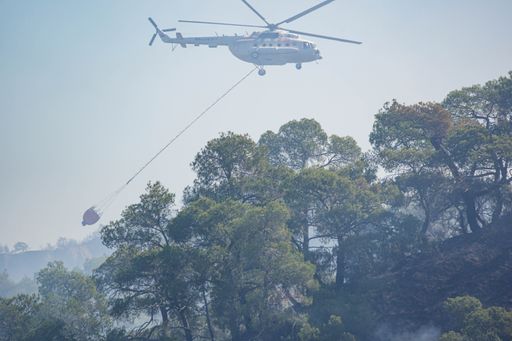This week, Turkish President Recep Tayyip Erdogan delivered a powerful message on the growing threat of wildfires, both at home and abroad.
Speaking in Ankara, at the Green Homeland Heroes on Duty event, he stressed on the national responsibility of humans to curb forest fires, and emphasised minor carelessness that can trigger catastrophes.
“The weather is getting hotter; humidity is dropping, and the winds are stronger. In these conditions, starting a fire even in an open field near a forest is a catastrophic mistake. This is not mere negligence. If it's not carelessness, then it is a clear betrayal,” Erdogan said during the event
His remarks reflect a global truth of the climate crisis. From Türkiye to California, Greece to Portugal, wildfires are increasingly being sparked by small human errors that quickly spiral into devastating blazes.

Here’s a breakdown of common causes and how small mistakes can ignite huge fires worldwide.
1. Discarded cigarette butts
Tossing lit cigarettes into dry grass is among the simplest, and deadliest, causes of wildfires. In drought-prone regions like California and southern Europe, such acts account for many fire outbreaks. The National Interagency Fire Centre, America’s logistical support centre for wildfire management, reports that human negligence accounts for a large share of fire ignitions nationwide.
2. Unattended campfires and BBQs
Campfires and barbecue pits, when left smouldering or unsupervised, remain a major cause of seasonal wildfires. The European Forest Fire Information System (EFFIS), which monitors fires via satellite data, notes that many summer fires in the region originate from recreational activities.
The US National Park Service estimates that around 85 percent of wildfires nationwide are started by human activities, including unattended campfires and careless disposal of cigarettes.
In Türkiye, a review of wildfire causes identifies stubble burning, waste fires, hunting activity, and discarded cigarette butts among the leading factors. Negligence, it concludes, is a consistent theme.
3. Burning garden waste or crop residue
In both the United States and Europe, agricultural burning remains a hazard.
The US Environmental Protection Agency warns that dry, windy conditions can turn such fires into fast-moving infernos, spreading smoke across wide areas. Farmers burning crop residue or gardeners burning waste without proper precautions can easily spark large, uncontrolled fires, especially during dry and windy conditions.
The European Commission highlights that climate change has increased the frequency and intensity of wildfires across Europe, making preventive actions, including cautious waste burning, more critical than ever.
Both agencies emphasise that uncontrolled burning during high-risk weather conditions significantly raises wildfire dangers, particularly in Mediterranean regions and parts of the midwestern United States.
4. Malfunctioning machinery and vehicles
Chainsaws, mowers, and hot vehicle exhausts can all spark fires in dry vegetation.
The US Forest Service highlights the importance of proper maintenance and safety when using mechanical equipment to reduce accidental fire starts, although exact wildfire cause percentages related to machinery are not publicly detailed.
In Europe, while data are limited, environmental officials warn that dry conditions combined with sparks from vehicles or equipment increase wildfire risks.
5. Fireworks and festive celebrations
Fireworks regularly ignite wildfires in both Europe and North America.
The European Commission has advised restricting pyrotechnics during periods of high fire danger.
In 2023, wildfires affected more than 500,000 hectares across Europe.
In 2024, one particularly egregious case occurred in Greece, where fireworks launched from a yacht caused a forest fire on the island of Hydra, prompting 13 arrests. The mayor expressed outrage and vowed legal action, underscoring the serious consequences of such negligence.
To mitigate these risks, the European Commission has stationed over 650 firefighters and aerial units across France, Greece, Portugal, and Spain ahead of the 2025 fire season.
6. Illegal logging and deforestation
Poorly managed or illicit logging dries forest floors, exposing brush to sun and wind. According to the UN Food and Agriculture Organization, land-use changes in the Mediterranean from agricultural expansion, tourism, and urban development have made forests more vulnerable to fire.
Illegal logging, overgrazing, and coastal development are degrading forests and increasing the risk of fire.
Addressing these issues requires integrated policies and investments to adapt forests to climate change, involving sectors such as forestry, agriculture, urban development, water, environment, land use planning, education, and tourism.
7. Power-line failures
Faulty or downed power lines have sparked some of the most destructive wildfires in recent memory.
The California Public Utilities Commission (CPUC) reports that while electric utility infrastructure has historically been responsible for less than 10 percent of reported wildfires, these incidents account for approximately half of California's most destructive fires.
The 2018 Camp Fire, the deadliest wildfire in California’s history, was sparked by a power-line failure during high winds. The equipment belonged to Pacific Gas and Electric (PG&E), a major utility headquartered in Oakland.
A similar lapse contributed to the 2022 Edgewood Fire, which was traced to inadequate clearance between electrical circuits, an issue flagged as early as 2016 but left unaddressed. PG&E was later fined $7 million for safety violations related to the blaze.
Why it matters
Erdogan’s reminder reflects a sobering reality: nearly all forest fires are human-caused.
The European Commission estimates that 96 percent of wildfires on the continent originate from human activity. These fires threaten biodiversity, worsen air quality, and destroy homes and lives.
The devastation seen in California, Türkiye, Greece, and beyond is, in most cases, avoidable. The solutions demand a greater sense of collective responsibility.



















